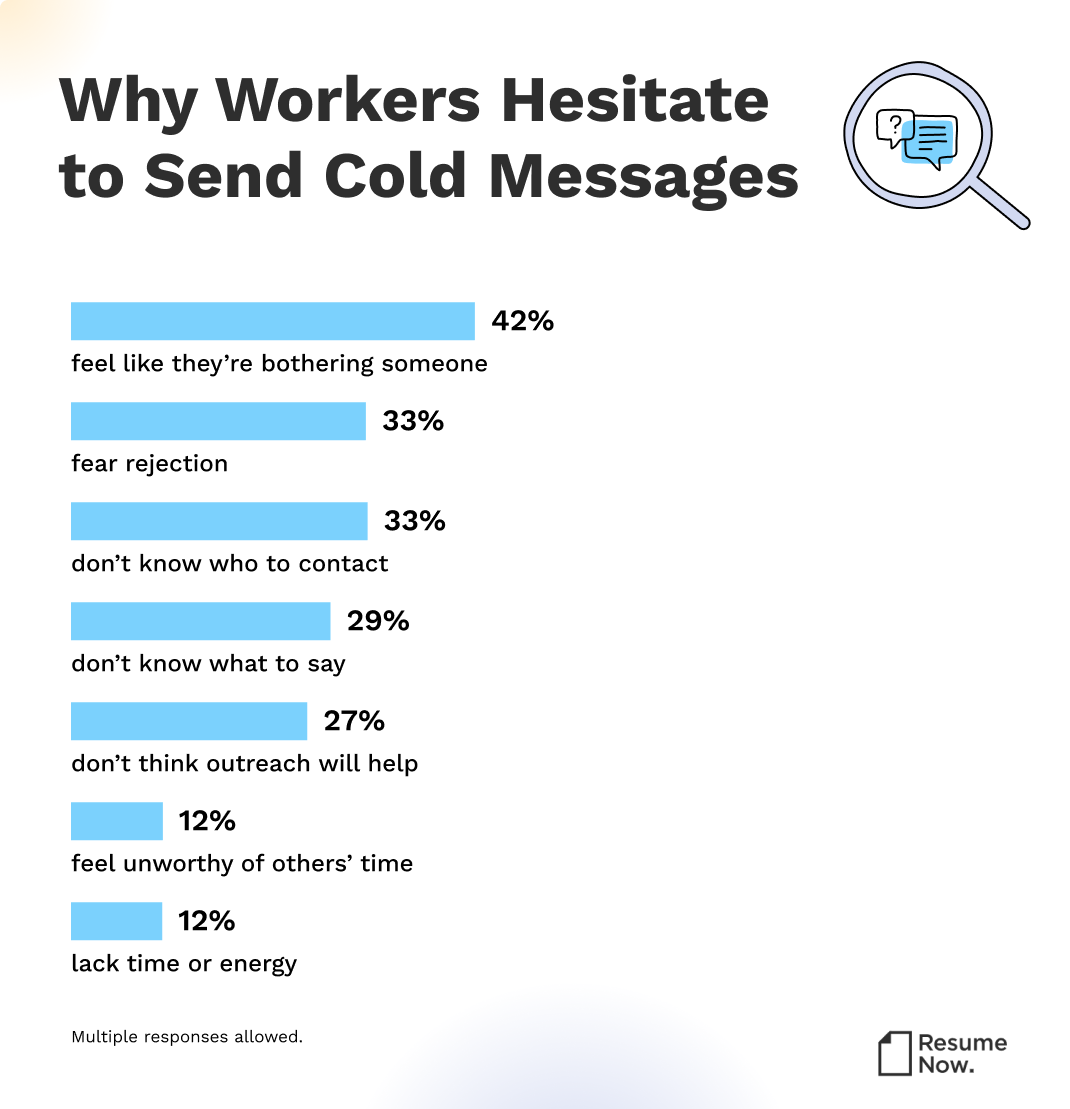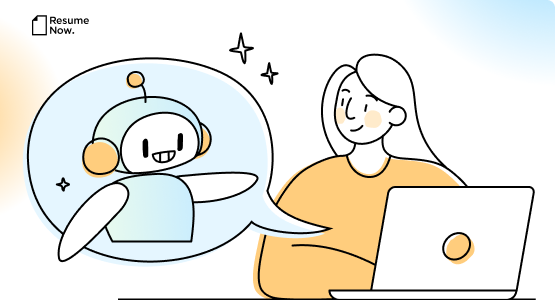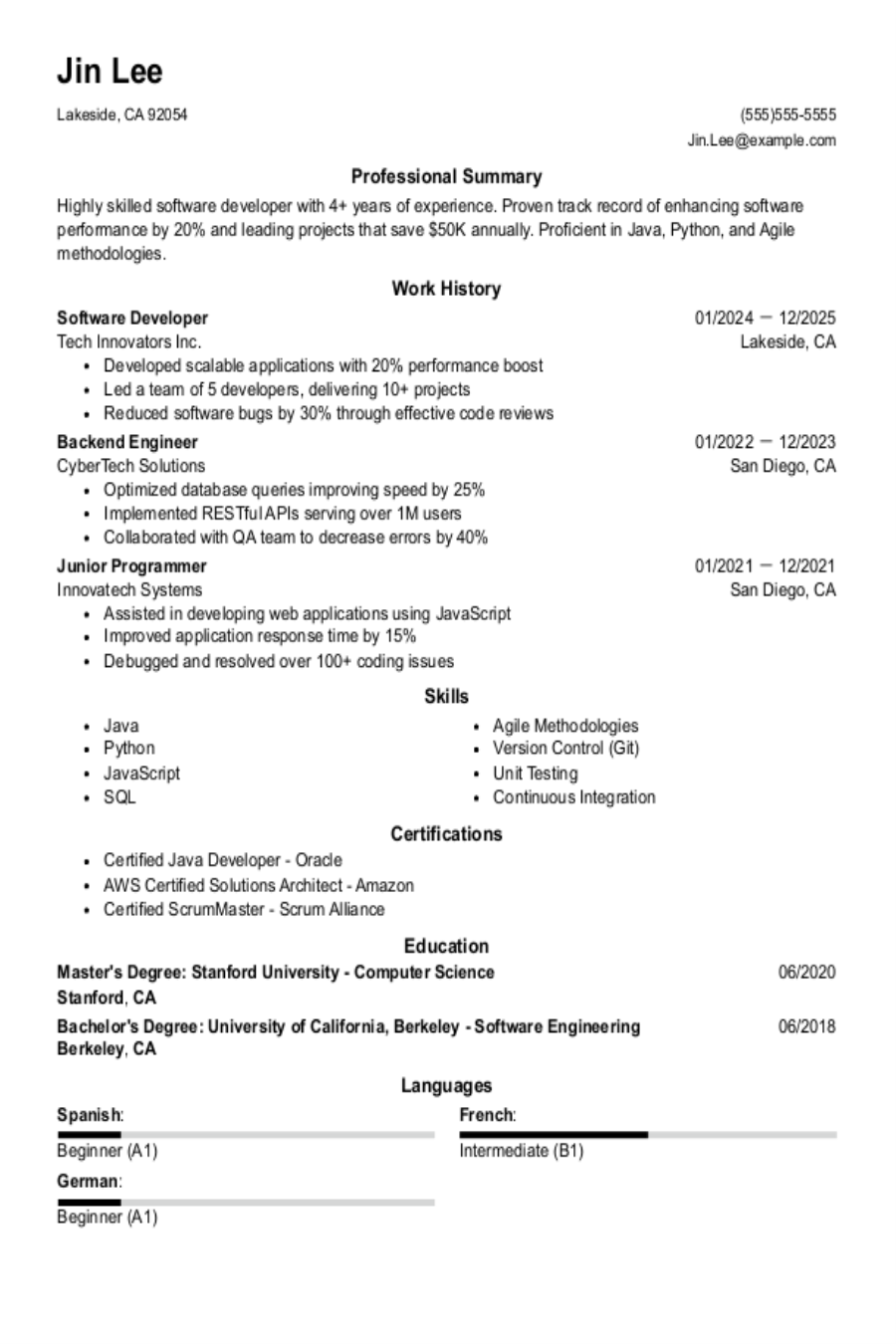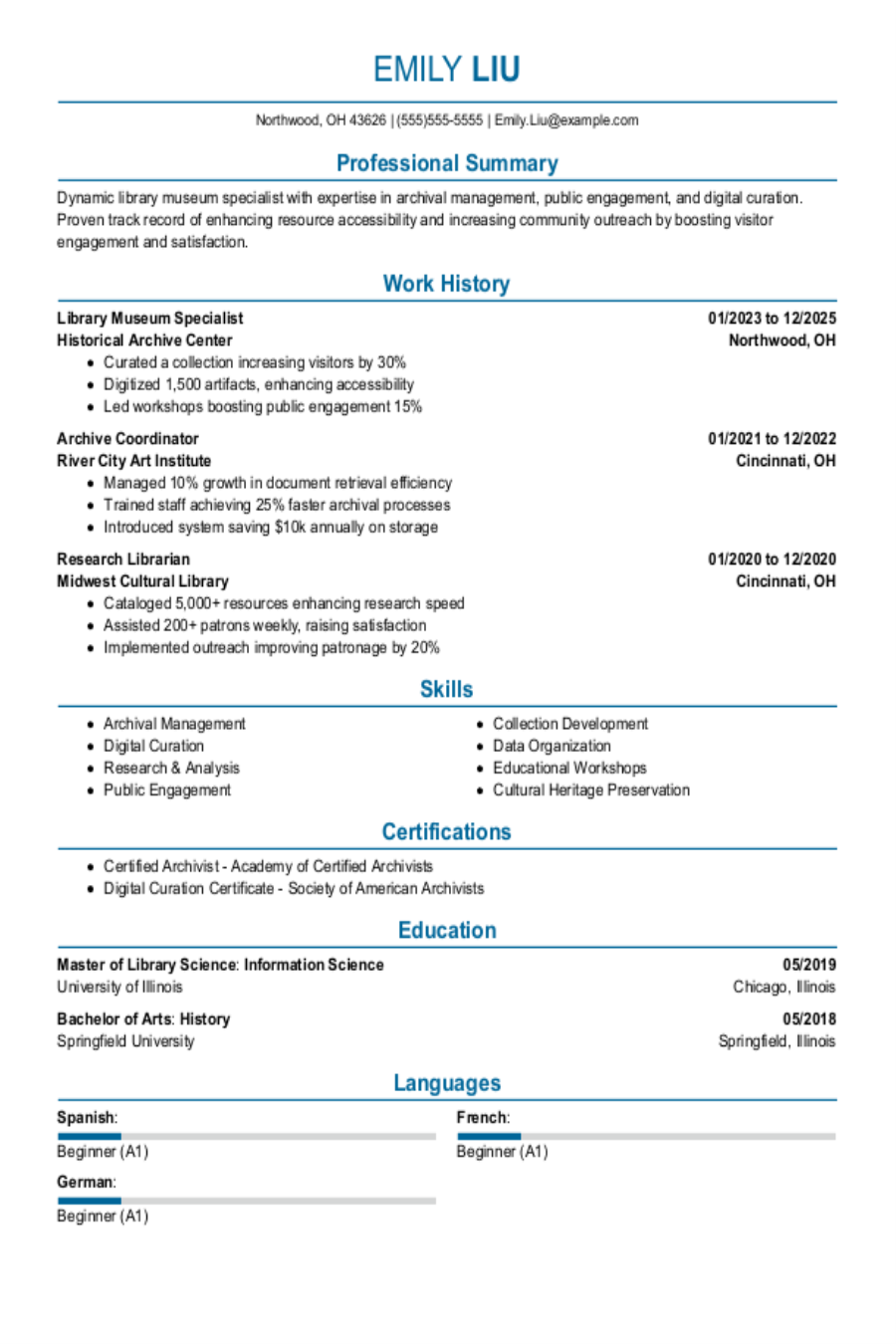Most professionals agree: it's not just what you know, it's who you know. In fact, 70% say your network matters more than your resume. But when it comes time to actually reach out, many freeze.
According to Resume Now's latest Networking in the New Job Market Report, fear of bothering someone, not knowing what to say, or worries about being judged often keep professionals from sending that first message. Despite the rise of remote work and AI tools that make connecting easier than ever, most workers still hesitate to engage in professional networking, and those who try often get ghosted.
In this post, we'll unpack the biggest reasons people hold back from networking, how AI is changing the game (for better or worse), and what job seekers can do to build connections in today's digital job market.
Key Findings
- Networking often outweighs credentials: 70% of professionals say who you know matters more than what's on your resume.
- Cold outreach is still rare: 42% of workers have never sent a cold message for professional opportunities, and another 22% have considered it but haven't followed through.
- Fear of being a nuisance holds people back: 42% say their biggest hesitation is worrying they're bothering someone.
- Elite education still shapes access: 82% believe attending a prestigious university makes it easier to build a strong network.
- AI is welcomed—with reservations: 56% support using AI to assist with networking, but 49% respond negatively if they find out a message was AI-written.
- AI writing tools are gaining traction: 33% have used tools like ChatGPT or Grammarly to help craft outreach messages.
- In-person connections still dominate: 54% prefer in-person events, while just 25% favor email or social media outreach.
The Cold Message Dilemma: Why Most Professionals Still Don't Reach Out
Even as networking becomes more important than ever, many professionals avoid cold outreach entirely. Whether it's fear, self-doubt, or uncertainty about how to begin, hesitation is common—and replies are rare.
- 42% have never sent a cold message and have no plans to.
- Another 22% have considered it but haven't followed through.
- Just 11% of professionals say nothing holds them back from networking—meaning 89% experience at least one hesitation.
- About one-third of those who've tried cold outreach say fewer than 1 in 4 messages get a reply.
Top reasons professionals hesitate:
- 42% feel like they're bothering someone.
- 33% fear rejection.
- 33% don't know who to contact.
- 29% don't know what to say.
- 27% don't think outreach will help.
- 12% feel unworthy of others' time.
- 12% lack the time or energy.

What this means: Networking can feel like a high-stakes gamble—especially when you don't know the rules. The fear of rejection or of being seen as annoying is enough to stop most people before they start. And when outreach efforts are met with silence, it only reinforces that hesitation.
Even workers with strong communication skills may hesitate to make the leap of faith into cold email outreach. But connections don't have to start perfectly to be valuable. A simple, thoughtful message, whether it's a casual email or a more direct letter of interest, can open doors—and using tools or templates can help ease the pressure. The more we normalize cold outreach, the less "cold" it feels.
Digital Tools in the Mix: In-Person Still Leads, but AI Makes Inroads
Despite the rise of remote work and digital platforms, old-school networking still holds strong. In-person events and warm introductions are the top choices for most professionals looking to flex their networking skills, and while AI-assisted outreach is growing, it comes with mixed feelings.
- 54% prefer in-person events.
- 44% prefer referrals or introductions.
- Digital methods like email (25%) and social media (25%) are common but not preferred.
- Only 14% favor virtual events.
AI-assisted networking is rising, but not without skepticism:
- 33% have used tools like ChatGPT or Grammarly to help write outreach messages.
- 33% haven't yet—but are open to trying.
- Only 13% are regular AI users.
- 49% say they'd be less impressed by a message they know was written by AI.
What this means: Face-to-face networking still feels the most authentic—and effective—for many workers. But as more professionals turn to remote roles and digital platforms, AI tools are starting to fill the gap. In a job market where more and more job-seekers are using ChatGPT to write resumes and apply for jobs, the role of AI is expanding.
Still, hesitation remains: nearly half say knowing a message was written by AI would make it less impressive. For job seekers, that means AI can be a helpful starting point, but it's still important to personalize and humanize your message. Used well, AI can reduce the anxiety of the first draft; just don't let it do all the talking.
Perception and Privilege: Bias Still Shapes Networking Access
For many professionals, the biggest challenge in networking isn't writing the message; it's worrying how they'll be perceived. From fears of being judged to concerns about systemic barriers, bias continues to limit who feels comfortable reaching out and taking advantage of the opportunities that professional networking can offer.
Concerns about judgment:
- 50% have hesitated to network due to fear of how they'd be judged.
Top worries include:
- Lack of experience (27%)
- Age (22%)
- Education (10%)
- Race or ethnicity (9%)
Structural bias is top of mind:
- 82% say attending a prestigious university makes it easier to build a network.
- 63% believe networking gives unfair advantages in hiring or promotions.
What this means: Networking isn't a level playing field, and most professionals know it. Whether it's ageism, racial bias, or education-based gatekeeping, many workers hesitate to reach out because they're afraid of being overlooked or dismissed.
These fears aren't unfounded. That's why creating inclusive networking spaces and mentorship opportunities matters. For job seekers, it's a reminder that imposter syndrome is often a symptom of exclusion, not a reflection of your worth. And for employers, it's a call to recognize that "who you know" shouldn't outweigh "what you can do."
Looking for a change of scenery? Our AI Resume Builder can help you land a new role by creating or updating your resume to meet the standards of the competitive job market.
Methodology
The findings provided were gathered through a survey conducted with 1,000 U.S. workers on May 3, 2025. Participants were asked about their networking habits, cold outreach experiences, use of AI tools, and perceptions of equity and access in professional relationship-building. The survey included a mix of question formats, including yes/no questions, multiple choice, Likert scale questions gauging agreement levels, and multi-select options.
For press inquiries, contact Joseph Santaella at joseph@resume-now.com.
About Resume Now
Resume Now is a powerful resource dedicated to helping job-seekers achieve their potential. Resume-Now's AI resume builder is a cutting-edge tool that makes creating a resume fast, easy, and painless. Resume Now has been dedicated to serving job seekers since 2005. Alongside its powerful AI resume builder and stylish, ready-to-use templates, it also features free advice for job seekers at every career stage, guides for every step of the hiring process, and free resources for writing cover letters. Resume-Now is committed to supporting job seekers and workers alike and has conducted numerous surveys related to the experience, trends, and culture of the workplace. These surveys have been featured in Business Insider, CNBC, Fast Company, Yahoo!, Forbes, and more. Keep up with Resume-Now on LinkedIn, Facebook, X, and Pinterest.
Keith is a Certified Professional Resume Writer (CPRW) and trusted media source in the career industry with over a decade of experience helping job seekers stand out.
More resources

What Is a CV? Curriculum Vitae Definition & Who Should Have One
Do you need to know what a CV stands for? We share the definit...

Hard Skills: 70+ Examples to Put on Your Resume
Hard skills are more important than ever in competitive indust...

AI Trends Heading Into 2026: Resume Now’s Year in Review
In 2025 artificial intelligence moved from buzzword to workpl...

Software Developer Resume: Examples & Templates
Keith Spencer CPRWCareer Expert Keith is a Certified Professi...

Logistics Resume: Examples & Templates
Keith Spencer CPRWCareer Expert Keith is a Certified Professi...

Library Museum Resume: Examples & Templates
Keith Spencer CPRWCareer Expert Keith is a Certified Professi...
